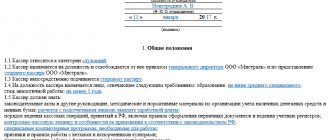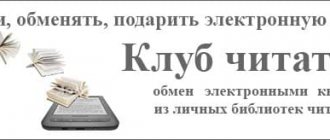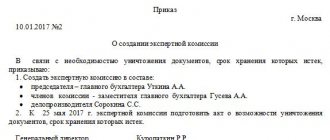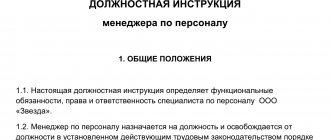History of the profession
This profession existed back in the USSR, but there it was called “personnel officer.” Briefly, the main activity was that it was necessary to:
- fill out documents stating that the employee worked for the company
- maintain and store personal information of each employee
- take part in the formation of instructions for company divisions
However, if we put aside the fact that management in the Russian Federation is in a fairly young state, the profession is changing gradually. Some functions still remain today, but the method of performing them has been modernized.
What does the job description include?
The first thing to note is that the legislator does not establish specific requirements for job descriptions. The company only needs to use its standard, which is established according to business customs. However, the fact that there is no formally defined form allows the employer to set his own criteria and make changes.
Now regarding what should be in the job description. By default, it is divided into 4 sections (Table 1).
| Section number | Description |
| First section | Approving information is written down: the date of registration, as well as the name and signature of the person who accepted it. In addition, this section may also contain notes indicating that the instructions comply with all standards with other divisions of the company. |
| Second section (main) | It contains information regarding the requirements that must be presented to the candidate at the interview stage, and information about the documents with which he will have to work (the level of knowledge and skills is assessed). Then comes the indication of the position and the general position of the employee in the hierarchy of a particular company. The final part includes the procedure for dismissal and the procedure for actions in cases where an employee needs to be replaced. |
| Third section | All responsibilities and rights of a HR specialist are discussed here. Often these sections are presented separately from each other. The schedule, specifics of work, etc. are outlined here, but depending on the company they can be changed. This is due to the fact that the legislation does not establish any framework. |
| Final part | This is information about responsibility and sanctions for violating job descriptions. |
One way or another, do not be surprised if the instructions in practice do not coincide with the standard established by business custom. The employer has the right to change it as he pleases.
What are the responsibilities of a HR inspector and what does he learn, watch the video:
II. Job responsibilities
- Exercises control over the timely execution of orders, orders and instructions from the head of the HR department.
- Keeps records of the personnel of the enterprise and its divisions in accordance with unified forms of primary documentation.
- Prepares the hiring, transfer and dismissal of employees in accordance with labor legislation, regulations and orders of the head of the enterprise, as well as other established personnel documentation.
- When hiring, introduces the regulations on discipline in the organization, working time and rest time, keeps records and issues service certificates.
- Provides instructions on safety precautions, industrial sanitation and fire protection, labor protection rules and regulations.
- Forms and maintains personal files of employees, makes changes to them related to work activities.
- Prepares the necessary materials for qualification, certification, competition commissions and nominations for employees for incentives and awards.
- Fills out, records and stores work books, calculates work experience.
- Makes entries in work books about incentives and awards for employees.
- Issues certificates of current and past labor activities of employees for presentation to other institutions.
- Maintains strict records of work books and inserts.
- Registers the receipt and issuance of work books and their inserts.
- Enters information about the quantitative, qualitative composition of employees and their movement into the data bank about the enterprise’s personnel, monitors its timely updating and replenishment.
- Keeps records of the provision of vacations to employees, exercises control over the preparation and compliance with regular vacation schedules.
- Prepares pension insurance cards and other documents necessary for assigning pensions to enterprise employees and their families, establishing benefits and compensation.
- Studies the movement and causes of staff turnover, participates in the development of measures to reduce it.
- Prepares documents upon expiration of the established periods of current storage for depositing in the archive.
- Exercises control over the state of labor discipline in the divisions of the enterprise and compliance by employees with internal and labor regulations.
- Keeps records of violations of labor discipline and monitors the timeliness of the administration, public organizations and labor collectives taking appropriate measures.
- Carry out one-time official assignments from the head of the HR department (the corresponding unit of the HR department).
Inspector's responsibilities
The job responsibilities of the specialist are formally defined and include the following list:
- Personnel records management. It includes working with documents regarding all transfers, dismissals or conflicts with personnel; approval and storage of all personnel files; personnel records according to the company’s primary documentation; storage of the company’s work books, as well as their recording and registration if necessary.
- Fulfilling instructions from management, which often includes preparing documents on qualifications and subsequent certification courses for company employees, including various awards and incentives from the company.
Timely editing of the entire database, entering and excluding information about specific employees from it.
- Formation of a staff vacation schedule, as well as timesheets that are responsible for recording working hours during the day.
- If an employee requires a certificate, various documentation about work, or an extract to submit to government agencies, the HR department also provides these papers.
- Agreeing with the company's management on job descriptions for each position and discussing the subsequent recruitment strategy (usually for the next year).
- Carrying out all preparatory activities for submitting documents to the archive.
- Consulting and interaction with certain industry divisions of the organization.
Thus, these are the basic responsibilities that must be performed by the entire HR department, regardless of changes made. If management decides to expand the scope of responsibilities, they are also fulfilled.
It is also worth noting an important nuance regarding the main activity. The HR department, represented by its chief specialist, has the right to get acquainted with the decisions of managers that affect HR departments.
It also follows from this that the department has the right to propose a more improved solution for consideration if it directly affects the work process.
Job Description of HR Inspector
"_____" _______________ 20___
HR inspectors
1. General Provisions
1.1. This job description defines and regulates the powers, functional and job responsibilities, rights and responsibilities of the HR inspector [Name of the organization in the genitive case] (hereinafter referred to as the Company).
1.2. The HR inspector is appointed and dismissed in accordance with the procedure established by current labor legislation by order of the head of the Company.
1.3. The HR inspector belongs to the category of specialists and reports directly to [name of the position of the immediate supervisor in the dative case] of the Company.
1.4. A person who has secondary vocational education without requirements for work experience or primary vocational education, special training according to an established program and work experience in the profile of at least 3 years, including at least 1 year in the given enterprise, is appointed to the position of personnel inspector.
1.5. The HR inspector must know:
- legislative and regulatory legal acts, methodological materials on maintaining documentation for accounting and personnel movement;
- labor legislation;
- structure and staff of the enterprise;
- the procedure for registration, maintenance and storage of work books and personal files of enterprise employees;
- the procedure for establishing the names of workers' professions and employee positions, general and continuous work experience, benefits, compensation, and registration of pensions for employees;
- the procedure for recording the movement of personnel and drawing up established reporting;
- the procedure for maintaining a data bank about the personnel of the enterprise;
- basics of office work;
- means of computer technology, communications and communications;
- rules and regulations of labor protection.
1.6. The HR inspector in his activities is guided by:
- local acts and organizational and administrative documents of the Company;
- internal labor regulations;
- rules of labor protection and safety, ensuring industrial sanitation and fire protection;
- instructions, orders, decisions and instructions from the immediate supervisor;
- this job description.
1.7. During the period of temporary absence of the HR inspector, his duties are assigned to [deputy position title].
2. Job responsibilities
The HR inspector performs the following labor functions:
2.1. Keeps records of the personnel of the enterprise and its divisions in accordance with unified forms of primary accounting documentation.
2.2. Prepares the hiring, transfer and dismissal of employees in accordance with labor legislation, regulations and orders of the head of the enterprise, as well as other established personnel documentation.
2.3. Forms and maintains personal files of employees, makes changes to them related to work activities.
2.4. Prepares the necessary materials for qualification, certification, competition commissions and the presentation of employees for incentives and awards.
This is important to know: Responsibilities of the shooting director at the site
2.5. Fills out, records and stores work books, calculates length of service, issues certificates of current and past work activities of employees.
2.6. Makes entries in work books about incentives and awards for employees.
2.7. Enters information about the quantitative, qualitative composition of employees and their movement into the data bank about the enterprise’s personnel, monitors its timely updating and replenishment. Keeps records of the provision of vacations to employees, monitors the preparation and compliance with regular vacation schedules.
2.8. Prepares pension insurance cards and other documents necessary for assigning pensions to enterprise employees and their families, establishing benefits and compensation.
2.9. Studies the causes of staff turnover and participates in the development of measures to reduce it.
2.10. Prepares documents upon expiration of the established periods of current storage for depositing in the archive.
2.11. Monitors the state of labor discipline in the organization’s divisions and employees’ compliance with internal labor regulations.
2.12. Prepares prescribed reports.
2.13. Takes the necessary measures to ensure the safety/non-disclosure of the Company’s trade secrets, as well as personal information about the Company’s employees.
In case of official necessity, the personnel inspector may be involved in the performance of his official duties overtime, in the manner prescribed by the provisions of federal labor legislation.
3. Rights
The HR inspector has the right:
3.1. Request and receive the necessary materials and documents related to the activities of the HR inspector.
3.2. Enter into relationships with departments of third-party institutions and organizations to resolve operational issues of production activities within the competence of the HR inspector.
3.3. Represent the interests of the enterprise in third-party organizations on issues related to its professional activities.
4. Responsibility and performance evaluation
4.1. The HR inspector bears administrative, disciplinary and material (and in some cases provided for by the legislation of the Russian Federation, criminal) responsibility for:
4.1.1. Failure to carry out or improperly carry out official instructions from the immediate supervisor.
4.1.2. Failure to perform or improper performance of one's job functions and assigned tasks.
4.1.3. Illegal use of granted official powers, as well as their use for personal purposes.
4.1.4. Inaccurate information about the status of the work assigned to him.
4.1.5. Failure to take measures to suppress identified violations of safety regulations, fire safety and other rules that pose a threat to the activities of the enterprise and its employees.
4.1.6. Failure to ensure compliance with labor discipline.
4.2. The assessment of the work of the HR inspector is carried out:
4.2.1. By the immediate supervisor - regularly, in the course of the employee’s daily performance of his labor functions.
4.2.2. The certification commission of the enterprise - periodically, but at least once every two years, based on documented results of work for the evaluation period.
4.3. The main criterion for assessing the work of a personnel inspector is the quality, completeness and timeliness of his performance of the tasks provided for in this instruction.
5. Working conditions
5.1. The work schedule of the HR inspector is determined in accordance with the internal labor regulations established by the Company.
5.2. Due to production needs, the HR inspector is required to go on business trips (including local ones).
6. Signature right
6.1. To ensure his activities, the HR inspector is given the right to sign organizational and administrative documents on issues within his competence by this job description.
I have read the instructions ___________/___________/ “__” _______ 20__
Requirements for a specialist
Considering that the HR department employee is a specialist, a number of requirements are put forward to him. So, the main thing is having an education. The employer determines the required work experience individually, however, it is often from 1 year.
Now regarding the deeper skills that are required for a specialist:
knowledge of legislation that regulates personnel production within the company
- method of accounting and personnel management
- the structure of each organization (discussed individually, if a different structure is provided for by law)
- ability to manage personal affairs of staff
- skills in using technical accounting and working with databases
- knowledge of the basics of office work
A number of companies provide training to employees if they meet the basic criteria. However, they also recommend that you first familiarize yourself with the list of skills that are required of them.
Peculiarities of the profession that a personnel officer encounters
A personnel officer, despite the extensive list of his responsibilities, is primarily involved in maintaining documentation in a particular organization. These are orders, employment contracts, regulations, employee statements, maintaining military records, pensions, benefits, etc.
What special features does a specialist occupying this position face?
The positive ones include:
- Working hours. In rare cases, overtime may occur. Basically, this is a standard schedule with fixed usual days off (Saturday and Sunday), as well as non-working days on public holidays. Most often, work is from 9:00 to 18:00, including a lunch break.
- A stable social package that includes all necessary payments.
In small organizations, the rights of employees may be violated, there may be no social package or official registration. Therefore, when applying for a job, you should give preference only to trusted companies that care about their employees.
- Paper work without much mobility.
- Opportunity for career growth and high salaries.
- Office work.
The negative ones include the following:
- In addition to direct responsibilities, there is a large amount of additional responsibilities, not always directly related to the specialty.
- Being between employees and management. This can be a disadvantage when you have to resolve negative situations.
- For some, paperwork in the office will seem like a minus.
- Monotone.
- Possible emergence of disagreements in working with accounting department.
- Responsibility in case of dishonesty of the hired employee.
An HR employee constantly encounters new people and must have communication skills, be able to organize people and his work, be friendly and at the same time master modern methods of personnel assessment. He must have the skills of mutual understanding and base his work on mutual cooperation. In addition, in his activities, the personnel officer constantly encounters interactions with third-party organizations. Such as the Pension Fund, State Labor Inspectorate and others).
The competence of a specialist in this field also depends on his ability to use technology and automation tools.
https://youtu.be/1addK2NSzoI
How to become a HR inspector
The primary criterion that must be met to obtain the position of HR inspector is the presence of a higher legal or economic education. This is a certain basis, without which the resume will not be considered.
Regarding obtaining all the skills that companies require, there are two ways: get an internship at a company and gain knowledge in practice, or attend relevant courses to obtain it. The only difference is that an internship after the course can be paid financially, not with knowledge.
Wage level
The monthly salary of a specialist who works in the human resources department depends on the company and its location in a specific subject of the Russian Federation. It is also necessary to take into account qualifications and work experience. Thus, the range is: 20,000-40,000 rubles. The average salary of a personnel officer in the Russian Federation is 25,000-30,000 rubles.
The company's HR department is an important element of the entire system. Thanks to it, the initial selection of employees takes place, as well as their emergency replacement in the event that ordinary employees cannot be present at work. This allows companies not to lose profits and increase their income through wise selection of employees.
Top
Write your question in the form below








